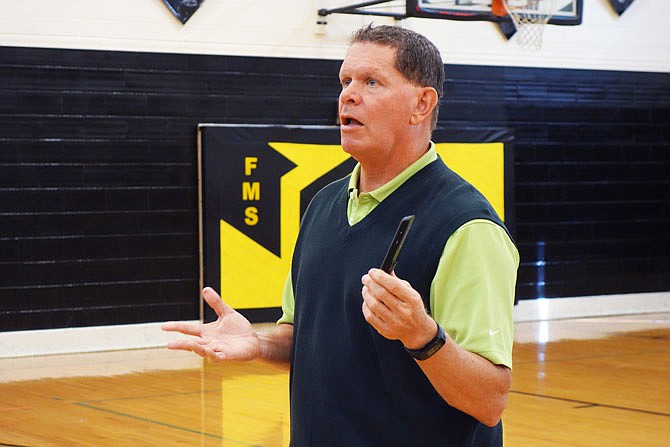He cries after each talk.
But the tears are worth it, Jim Marshall said, to share his son Cody's story.
"I don't like doing this," he said. "(But) I believe we don't have enough dialogue or education for youth to have the information they need to make good choices."
Marshall spoke Wednesday to Fulton Middle School students about losing his son to an overdose, and about the importance of developing good coping mechanisms. He's delivered hundreds of similar talks, to students and parents alike, since his son died six years ago. Marshall has spent 38 years as an educator, working in North Callaway, Jefferson City, Westminster College and now William Woods University as the head cross country/track and field coach.
Marshall said Cody's struggles started after a traumatic brain injury at age 3 left him with a learning disability. Adderall and Ritalin helped him focus in school, but those prescription drugs were not enough to help him get into college. Stuck in a factory job at 18, Cody felt down, Marshall said.
"Someone there introduced him to Xanax," Marshall said.
Cody went from Xanax, a potentially addictive sedative used to treat anxiety and panic disorders, to heroin. He stole from friends and family to support the addiction.
At this point in the story, Marshall said, his audiences usually start drawing on negative stereotypes about addicts. But Cody wasn't a bad person, he added.
"Cody was a kid who fed a homeless guy two or three times a week with the money he made himself," he said. "At Cody's visitation, six kids in wheelchairs were lined up. They said he was one of the few who'd give them high-fives and treat them like anyone else."
But, Marshall stressed, addiction changes people.
Six years ago, Cody took Xanax and heroin together and overdosed. Rather than getting help, Marshall said, the people who were with him abandoned him for dead. Marshall found him, called 911 and performed CPR. Cody spent four days in an induced coma.
"Then, I heard doctors tell me they needed to remove the vent because he's brain-dead," Marshall said.
A nurse told Marshall that Cody indicated on his driver's license he wanted to be an organ donor. Cody's kidneys, heart and other organs went to save the lives of others.
That's when Marshall began his own fight.
National problem
"We have a terrible problem in our country," he said. "This is the real war of all wars. This is one of those things that could end mankind, and we're doing it to ourselves."
In the past five years, overdoses in Missouri have nearly quadrupled, he said. He also cited the statistic that a person between ages 15-25 dies of an overdose every eight minutes - versus every six hours for car crashes.
Callaway County has a population of about 45,000 residents. Charles W. Anderson, director of the county's ambulance district, said the district has responded to 54 overdose calls since Feb. 1. They've given doses of Narcan, an anti-overdose drug, 30 times.
The district recently helped pass an ordinance authorizing Narcan use by first responders, and is currently working with law enforcement and fire departments within the county to decide which personnel will carry the medication.
"In many places, law enforcement and fire department personnel carry Narcan," Anderson said. "We would like to accomplish this in Callaway County."
Marshall sees two main reasons for the increases in drug use among youth. First is a national over-reliance on medication.
"We're trying to self-medicate our problems away," he said. "We think a pill takes care of everything."
Marshall pointed out despite making up 5 percent of the world's populations, Americans take 90 percent of all medications produced in the world.
He's not against all mental health-related medication, but thinks it should be prescribed largely by specialists rather than family physicians.
Americans are conditioned to see medication as a universal solution, Marshall said. When they run into difficulties (for example, they're having trouble focusing at college) and someone offers them a medication (like Adderall), they're more likely to accept the offer.
Marshall said by their sophomore year of college, half of all students will have been offered a prescription medicine by one of their peers. One in five will have accepted it.
"Between 75 and 80 percent of heroin addicts start on prescription medications," Marshall said.
The second big problem Marshall sees is today's children aren't taught healthy coping methods.
"We're all going to lose friends and family members," he said. "We're all going to get kicked in the gut by life, if we haven't already."
Marshall said parents tend to shield their children from life's realities - intervening when trouble threatens and solving problems for them.
Fixing it
Marshall told his student audience to learn healthy ways to cope with stress and problems.
"You can create happiness without drugs," he said.
He likes to work out and spend time talking through things with friends. And while giving talks is emotionally difficult, knowing he's helping people lifts his spirits.
"This is my Percocet, this is my Oxycontin, this is my Vicodin," he said.
He also asked the students to practice empathy for people with addictions and not make cruel jokes.
"Cody was embarrassed to tell me he had a problem," he said. "He didn't want to see his coach father get blacklisted in the community."
Since Cody's death, Marshall has become politically active. He sponsored the Good Samaritan law, SB 501, which passed this year. The law introduces protections from arrest for people who call 911 for someone overdosing on drugs.
He also speaks out against the so-called "War on Drugs." Marshall said incarcerating people with addictions makes them more likely to continue taking drugs. Instead, he said people need access to rehabilitation programs.

